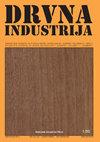Shear Force Capacities of H-Type Furniture Joints Constructed of Various Heat-Treated Wood Species
IF 0.8
4区 农林科学
Q4 MATERIALS SCIENCE, PAPER & WOOD
引用次数: 0
Abstract
The aim of this study was to investigate the effect of wood species, heat treatment, adhesive type and joint technique on shear force capacity of H-type furniture joints. For this purpose, an experimental design that consisted of 3 wood species, 2 treatment processes (untreated, heat-treated), 2 adhesive types (polyurethane (PUR), polyvinyl acetate (PVAc)) and 2 joint techniques (dowel, mortise-tenon (MT)) and 5 replications for each group were prepared, and accordingly, a total of 120 specimens were tested under static shear loads. Siberian pine (Pinus sibirica), Iroko (Chlorophora excelsa), and common ash (Fraxinus excelsior), which are commonly used in furniture constructions, were used as wood species. In general, iroko showed the highest shear force capacity between the wood species. The specimens constructed of heat-treated wood species showed lower shear force capacity by approximately 15 % in comparison to the same untreated specimens. MT joints showed better performance than dowel joints higher by approximately 21 %. PVAc adhesive gave higher values than PU adhesive by around 5 %. According to the results of four-way interactions, highest shear force capacities of H-type joints were obtained from “Common ash-PVAc-MT” combination in groups of untreated specimens and from “Iroko-PU-MT” combination in groups of heat-treated specimens.不同热处理木材H型家具节点的抗剪性能
本研究旨在探讨木材种类、热处理方式、胶粘剂种类及接缝工艺对h型家具接缝抗剪承载力的影响。为此,设计了3种木材、2种处理方法(未经处理、热处理)、2种胶粘剂(聚氨酯(PUR)、聚醋酸乙烯酯(PVAc))和2种连接方法(榫、榫卯(MT))的试验设计,每组5个重复,共进行了120个试件的静剪切试验。西伯利亚松(Pinus sibirica), Iroko (Chlorophora excelsa)和普通灰(Fraxinus excelsior),这些通常用于家具结构,被用作木材品种。总的来说,iroko在两种木材中表现出最高的剪切能力。与未经处理的样品相比,由热处理木材制成的样品显示出较低的剪切力能力约15%。MT接头的性能比榫接头高约21%。PVAc胶粘剂的数值比PU胶粘剂高5%左右。四向相互作用结果表明,未处理组h型节理的抗剪承载力最高,为“Common ash-PVAc-MT”组合,热处理组为“Iroko-PU-MT”组合。
本文章由计算机程序翻译,如有差异,请以英文原文为准。
求助全文
约1分钟内获得全文
求助全文
来源期刊

Drvna Industrija
MATERIALS SCIENCE, PAPER & WOOD-
CiteScore
1.80
自引率
9.10%
发文量
32
审稿时长
>12 weeks
期刊介绍:
"Drvna industrija" ("Wood Industry") journal publishes original scientific and review papers, short notes, professional papers, conference papers, reports, professional information, bibliographical and survey articles and general notes relating to the forestry exploitation, biology, chemistry, physics and technology of wood, pulp and paper and wood components, including production, management and marketing aspects in the woodworking industry.
 求助内容:
求助内容: 应助结果提醒方式:
应助结果提醒方式:


